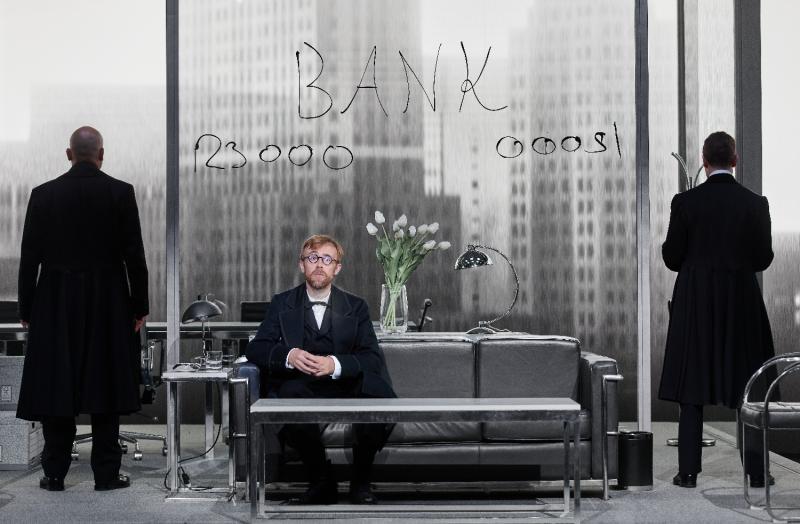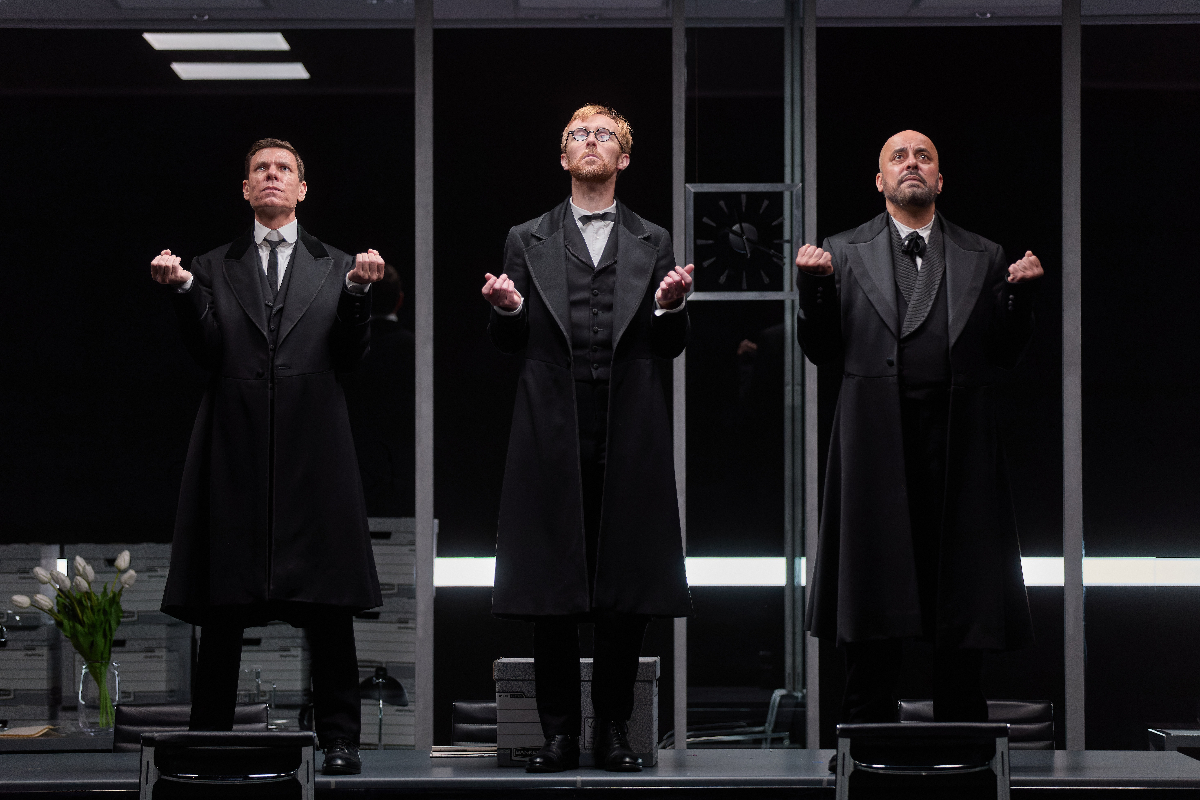The Lehman Trilogy, Gillian Lynne Theatre review - three brothers, two crashes, one American Dream | reviews, news & interviews
The Lehman Trilogy, Gillian Lynne Theatre review - three brothers, two crashes, one American Dream
The Lehman Trilogy, Gillian Lynne Theatre review - three brothers, two crashes, one American Dream
Sensational stagecraft elevates familiar tale of immigrant success in the USA

Merchant bankers then eh? It’s not a slang term of abuse for nothing, as the middlemen collecting the crumbs off the cake (in Sherman McCoy’’s analogy from The Bonfire of the Vanities) have a reputation for living high on the hog off the ideas and industry of others. They’re the typess who might work as a subject for a cynical musical, but in a straight drama?
Stefano Massini's play, adapted by Ben Power, never quite loses that vacuum at its centre, as it tells the story of The American Dream for the umpteenth time, sidestepping some inconvenient truths (also for the umpteenth time), while dialling up the disruptor as innovator trope and sacrificing analysis in favour of exposition. Nobody wants to feel the weight of a 15,000 word critique of capitalism by Noam Chomsky in The New Left Review after a day at the office, but at different times, different members of the audience will surely find themselves muttering, "Yes, but there's more to it than that!"
 With the Statue of Liberty anachronistically behind him, Henry Lehman arrives in the USA from Germany with a decent pair of shoes, a sharp brain and a positive attitude – but not much else. He fetches up in Montgomery, Alabama, where he is joined by his younger brothers, Emanuel, less polished but loyal, and Mayer, whose knack for finding compromises proves invaluable to the family and the business.
With the Statue of Liberty anachronistically behind him, Henry Lehman arrives in the USA from Germany with a decent pair of shoes, a sharp brain and a positive attitude – but not much else. He fetches up in Montgomery, Alabama, where he is joined by his younger brothers, Emanuel, less polished but loyal, and Mayer, whose knack for finding compromises proves invaluable to the family and the business.
Trading out of a tiny general store, the brothers sell the bare necessities of life to the slaves who pick the cotton on The South’s vast plantations, with Sundays particularly profitable as, holding to their Jewish faith if not their Jewish names, they only close on Shabbat. Soon they’re selling to the slaveholders too and, showing the amoral entrepreneurial spirit and willingness to embrace risk that was to be passed down the generations, they diversify, expand and ride out disasters like crop fires and the Civil War. To a businessman, it’s an ill wind that blows nobody any good.
Henry is carried off by yellow fever, but his personality guides the younger brothers and their sons (daughters are not really a thing in this play) and they’re soon in New York, trading cotton and then setting up as an investment bank, eyes always on the prize. They’re buffeted, but not downed, by the Wall Street crash of 1929 and grow and grow, as the USA’s brand of free market capitalism shapes the post-war world. Lehmans come and go as the decades fly by, and it’s long after the last of those who bear the name have passed when hubris catches up with the company. In the third century of its existence, it becomes the poster child of the 2008 financial crisis, the no longer masters-of-the-universe in shirt sleeves and braces, carrying their iconic cardboard boxes along Wall Street, as Lehman Brothers breathes its last breath and plenty of Ordinary Joes smirk as they ingest a large helping of schadenfreude.
What brings this linear, familiar tale to such vivid life and, I suspect, led to its well-stocked awards cabinet from its 2018 run at the National Theatre and 2022 spell on Broadway, is the sheer chutzpah of its staging and acting.
On Es Devlin’s shiny set of 21st century glass and grey steel, Sam Mendes keeps his three actors in their nineteenth century tailored suits, underlining the past’s persistence into the present. The set continually spins, the dizzying ascent of the immigrants, their sons’ integration into a secular society, the incessant march of their business into new industries opened up by advances in science and technology, underlined by the constantly disorienting perspectives. With Luke Hall’s sparingly used video projections and Cat Beveridge’s evocative piano, each of the three acts has an identity of its own within America’s roaring whirlwind of opportunities.
Three actors play the three founding brothers, but also deliver plenty more roles with wit, technical vituosity and about as much warmth as can be found in hardheaded financiers. John Heffernan, Aaron Krohn and Howard W. Overshown (pictured above) command the stage, building Lehmans from childhood to dotage but also an array of businessmen, what we would now call "tech bros" and wives and kids, with merely a change of tone in voice or a modification in gait and, sometimes, just the words themselves.
Heffernan finds the single-minded ruthlessness of Philip Lehman, Krohn brings out the charm of Mayer Lehman and Overshown is at his best as the bright and brutish Lew Glucksman, who pushes out the old school bankers with his lethal combination of overarching arrogance and deep intuitive understanding of computerised trading. The three, whether working individually or collectively, are utterly compelling across the three hours runtime, a tour-de-force display of stagecraft and stamina.
There is something missing though, a bloodlessness at the heart of the narrative. The issue of slavery is mentioned only in passing, the dead of the Civil War reported as numbers as if on a balance sheet, the misery of the 1930s Depression and the (still ongoing) 2010s mental health and drugs crisis, at least partly caused by the 2008 crash, studiously ignored. The truth that capitalism depends more on belief than reality is driven home (with the Mad Menish advertisers’ and marketers’ doublespeak getting a well deserved shoeing) but there’s not much of that neglected reality on stage. The closest we get to the other side of the capitalist's coin is Herbert Lehman, who realises that winners beget losers and goes off to become FDR's right hand man in NYC. At times, one can be seduced into the same kind of comfortable reverie into which one can drift during a very slick Ted Talk by a rollneck clad, Steve Jobs wannabe – dangerous. The play has an academic and didactic tone, leavened with a side otder of boosterism, father than a romantic soul – and is the lesser for it.
Ultimately, that verdict is a reflection of the production being, to some extent, hoist by its own petard, the success and invulnerability of the brothers, and the consequent absence of jeopardy, maintaining a distance between the audience and the characters. Where is the hero? Where is the villiain? Where is the joy? One is left feeling the same about the play as one does about the Lehmans – more to be admired with reservations than to be loved unequivocally.
rating
Explore topics
Share this article
The future of Arts Journalism
You can stop theartsdesk.com closing!
We urgently need financing to survive. Our fundraising drive has thus far raised £49,000 but we need to reach £100,000 or we will be forced to close. Please contribute here: https://gofund.me/c3f6033d
And if you can forward this information to anyone who might assist, we’d be grateful.

Subscribe to theartsdesk.com
Thank you for continuing to read our work on theartsdesk.com. For unlimited access to every article in its entirety, including our archive of more than 15,000 pieces, we're asking for £5 per month or £40 per year. We feel it's a very good deal, and hope you do too.
To take a subscription now simply click here.
And if you're looking for that extra gift for a friend or family member, why not treat them to a theartsdesk.com gift subscription?
more Theatre
 Troilus and Cressida, Globe Theatre review - a 'problem play' with added problems
Raucous and carnivalesque, but also ugly and incomprehensible
Troilus and Cressida, Globe Theatre review - a 'problem play' with added problems
Raucous and carnivalesque, but also ugly and incomprehensible
 Clarkston, Trafalgar Theatre review - two lads on a road to nowhere
Netflix star, Joe Locke, is the selling point of a production that needs one
Clarkston, Trafalgar Theatre review - two lads on a road to nowhere
Netflix star, Joe Locke, is the selling point of a production that needs one
 Ghost Stories, Peacock Theatre review - spirited staging but short on scares
Impressive spectacle saves an ageing show in an unsuitable venue
Ghost Stories, Peacock Theatre review - spirited staging but short on scares
Impressive spectacle saves an ageing show in an unsuitable venue
 Hamlet, National Theatre review - turning tragedy to comedy is no joke
Hiran Abeyeskera’s childlike prince falls flat in a mixed production
Hamlet, National Theatre review - turning tragedy to comedy is no joke
Hiran Abeyeskera’s childlike prince falls flat in a mixed production
 Rohtko, Barbican review - postmodern meditation on fake and authentic art is less than the sum of its parts
Łukasz Twarkowski's production dazzles without illuminating
Rohtko, Barbican review - postmodern meditation on fake and authentic art is less than the sum of its parts
Łukasz Twarkowski's production dazzles without illuminating
 Lee, Park Theatre review - Lee Krasner looks back on her life as an artist
Informative and interesting, the play's format limits its potential
Lee, Park Theatre review - Lee Krasner looks back on her life as an artist
Informative and interesting, the play's format limits its potential
 Measure for Measure, RSC, Stratford review - 'problem play' has no problem with relevance
Shakespeare, in this adaptation, is at his most perceptive
Measure for Measure, RSC, Stratford review - 'problem play' has no problem with relevance
Shakespeare, in this adaptation, is at his most perceptive
 The Importance of Being Earnest, Noël Coward Theatre review - dazzling and delightful queer fest
West End transfer of National Theatre hit stars Stephen Fry and Olly Alexander
The Importance of Being Earnest, Noël Coward Theatre review - dazzling and delightful queer fest
West End transfer of National Theatre hit stars Stephen Fry and Olly Alexander
 Get Down Tonight, Charing Cross Theatre review - glitz and hits from the 70s
If you love the songs of KC and the Sunshine Band, Please Do Go!
Get Down Tonight, Charing Cross Theatre review - glitz and hits from the 70s
If you love the songs of KC and the Sunshine Band, Please Do Go!
 Punch, Apollo Theatre review - powerful play about the strength of redemption
James Graham's play transfixes the audience at every stage
Punch, Apollo Theatre review - powerful play about the strength of redemption
James Graham's play transfixes the audience at every stage
 The Billionaire Inside Your Head, Hampstead Theatre review - a map of a man with OCD
Will Lord's promising debut burdens a fine cast with too much dialogue
The Billionaire Inside Your Head, Hampstead Theatre review - a map of a man with OCD
Will Lord's promising debut burdens a fine cast with too much dialogue

Add comment